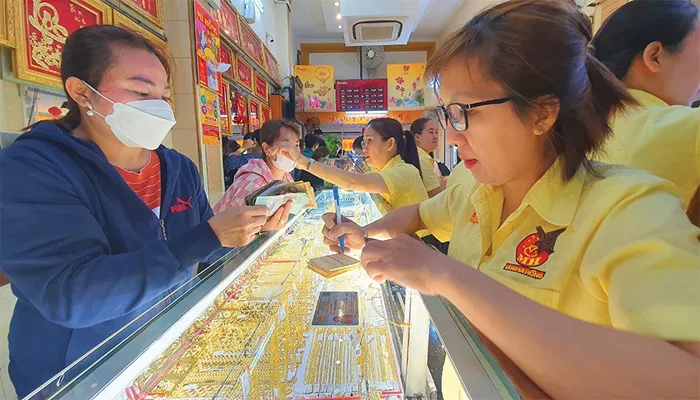Vietnam is taking strategic steps toward establishing itself as a regional and international gold trading hub by creating a more transparent and better-managed gold market.
On May 30, the State Bank of Vietnam announced the results of inspections on six major gold trading entities, including SJC, DOJI, PNJ, Bao Tin Minh Chau, TPBank, and Eximbank. The investigation uncovered significant violations primarily related to anti-money laundering regulations, such as insufficient customer identification and failure to report large transactions.
Additional issues included discrepancies in documentation, accounting, and taxation, along with misleading product information aimed at attracting customers, leading to unfair competition. As a result, SJC, PNJ, and DOJI were fined $85,600, $3,600, and $54,600 respectively, while Bao Tin Minh Chau received the highest penalty of $105,600.
General Secretary Su Lin chaired a Central Policy and Strategy Committee meeting, emphasizing the urgent need for comprehensive reforms in gold market management. He stressed that the state should not replace the market but instead establish fair rules and controlled supervision to foster a healthy gold market. This approach, he said, would treat gold as a resource rather than a policy burden.
Su Lin also advocated for the development of Vietnam’s domestic gold jewelry sector, aiming to position the country as a leading manufacturer and exporter of high-quality gold products. This would help transform hoarded gold into value-added goods.
He further highlighted the necessity of quickly establishing a gold market information and data system to improve transparency and disclosure. Such a system would enable effective taxation, regulation, and impact assessment related to foreign exchange, exchange rates, and investment channels.
Secretary Lam Cheng Yuet echoed the call to enhance governance and cross-sector coordination in the gold market, particularly to combat gold smuggling. He noted the critical role of gold industry associations in bridging gold enterprises and regulatory bodies, helping to promptly identify challenges, propose policy recommendations, and coordinate measures to stabilize the market when needed.
Responding to these remarks, Associate Professor Nguyen Tri Long, former director of the Ministry of Finance’s Pricing and Market Research Institute, emphasized the need to end rigid administrative controls over the gold market. He noted that previous policies—such as supply restrictions, gold bar monopolies, and import limits—though intended to stabilize exchange rates and curb dollarization, have resulted in significant market distortions.
Long pointed out that record-high price gaps between domestic and international gold prices have fueled speculation and smuggling, forcing consumers to pay inflated prices and undermining trust in gold as a legitimate savings asset.
He called for ending the gold bar monopoly and allowing controlled imports based on actual production capacity, legal compliance, and transparent audits rather than rigid auctions. This, he said, would ensure fair competition and reduce market manipulation.
Long concluded that Vietnam needs a market-driven, orderly, and internationally aligned gold policy. He advocated for establishing a national gold exchange, ideally within Ho Chi Minh City’s international financial center, to ensure transparent and centralized trading while curbing black market activity.
Associate Professor Pham The Vinh, Dean of the National Economics University’s School of Economics, agreed with the proposal to establish a gold exchange, saying the timing is right to develop the legal framework for such an institution.
He stated, “A gold exchange would reduce dependence on physical gold, creating a market that people trust. The State Bank of Vietnam must revise Decree No. 24 on gold market management. Recent market behavior reflects macroeconomic instability. While domestic gold prices follow global trends, they display higher volatility. Removing exclusive gold brand monopolies would foster a freer, more competitive gold market.”
Related Topics:
Traders Await U.S. Jobs Data as Gold Holds Steady
Vietnam to Reform Gold Trading Regulations This Month
Experts Advocate for Leveraging Gold to Fuel Economic Growth in Vietnam

